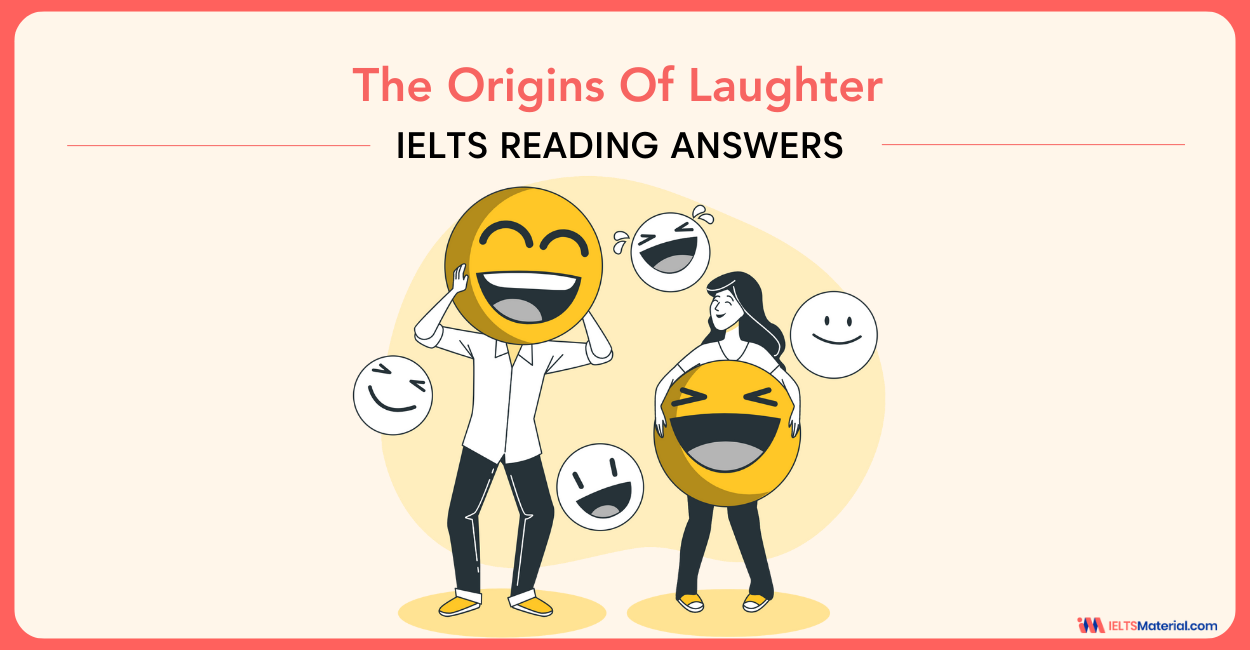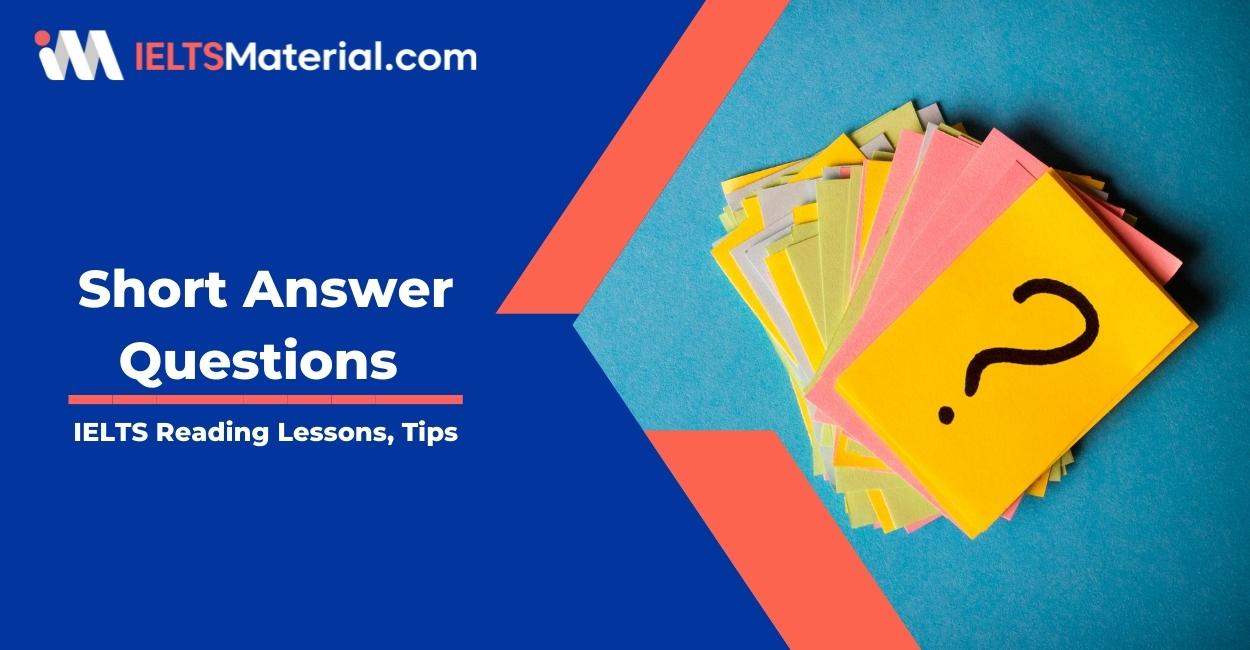Short Answer Questions IELTS Reading Lessons, Tips
Table of Contents
Limited-Time Offer : Access a FREE 10-Day IELTS Study Plan!
Understanding IELTS Short Answer Questions
Most of the time, candidates find this question type to be the easiest. Basically, all you have to do is read the given text and simply answer a specific set of questions in one to three words. Considering that this question type is not too difficult, candidates may get tempted to rush through questions. However, this may lead to unwanted mistakes. Thus, ensure that you are careful while answering.
Strategies for answering the Short Answer questions
There are a few strategies that have to be borne in mind while answering these types of questions. They are listed below:
- Read the instructions carefully, taking special notes of the word limit for the answer
- Read the questions and understand what is being asked.
- Underline all of the keywords and think of potential synonyms.
- Stay cautious for all the synonyms and keywords. However, don’t read each and every line. Skim through the text.
- Read the first question. Then, scan the first and second paragraphs until you find the answer. Repeat the process for each question.
Tips for Short Answer Questions IELTS questions
Some tips to answer the questions and obtain a high band in the IELTS examination are given below:
- First read the question and then read the text
- Understand what is being asked
- The answers are going to be in the order, so look likewise
- Don’t go beyond the word limit
- Use the real words as mentioned in the text
Sample Practice
The Pursuit of KnowledgeA. According to the great English lexicographer Samuel Johnson, knowledge is of two kinds. We know a subject ourselves or we know where we can find information upon it (Boswell Life vol. 2 p, 383 18 April 1775). In the information-driven world we now inhabit, the latter has assumed a much greater level of importance. It Is not surprising to see people overwhelmed by the unlimited stream of Information. There is simply too much of it to assimilate, and it is difficult to know what to do with the data once it is received; which brings us back to Johnson’s words. But we need to add another dimension to his dictum, one which was probably true in his time, but is even more pertinent today: people need to be able to live the knowledge they acquire and not just know it or know where to find it. Our deficiency in this regard is, perhaps, the most singular failure of the modern information age. B. Acquisitiveness is a natural human Instinct. Children collect cards of footballers, or whatever is the latest fad, Stamps, coins and books are targets for children and adult collectors (dike, as their basic instincts are played upon and nurtured by market forces. The desire to gather knowledge is nothing new. What is astonishing, however, is the way in which people treat the knowledge once it has been collected. It is as if the collection were an end in Itself; and herein lies the great deception, We have turned the world into a large machine of information, a veritable vortex into which we are all being Inexorably sucked, People beaver away amassing raw data, labouring under the misapprehension that they are doing something worthwhile when all that is really happening is the movement of information from one place to another, We should hardly be surprised that, as this becomes apparent, disillusionment and stress in the workplace are becoming sadly the all too common consequences. |
Questions 1-4
Answer the questions below. Use NO MORE THAN SIX WORDS from the passage for each answer.
Write your answers next to 1-4 on your answer sheet.
- What exactly overwhelms people?
- What is the singular failure of the modern information age?
- According to the author, what has the world turned into?
- What are the consequences in the workplace of moving large amounts of raw data around?
Answers
| 1. Stream of information
2. Inability to live the acquired knowledge 3. Large machine of information 4. Disillusionment and stress in the workplace |
Explanation
| For the first question, the answer is in the first para, fourth line; “It Is not surprising to see people overwhelmed by the unlimited stream of Information..”
For the second question, the answer is in the first para, seventh line; “But we need to add another dimension to his dictum, one which was probably true in his time, but is even more pertinent today: people need to be able to live the knowledge they acquire and not just know it or know where to find it. Our deficiency in this regard is, perhaps, the most singular failure of the modern information age.” For the third question, the answer is in the second para, first line; “Acquisitiveness is a natural human Instinct. Children collect cards of footballers, or whatever is the latest fad, Stamps, coins and books are targets for children and adult collectors (dike, as their basic instincts are played upon and nurtured by market forces. We have turned the world into a large machine of information.” The fourth question is in the second para, fifth line; “It is as if the collection were an end in Itself; and herein lies the great deception, We have turned the world into a large machine of information, a veritable vortex into which we are all being Inexorably sucked” |
FAQs
What is a short response question?
Short answer questions are the open-ended questions that need you to write an answer. Commonly, they are used to evaluate the basic knowledge and understanding.
What skills are tested with short answer questions?
Skills like ability to skim the paragraphs and understanding the meaning, proficiency in scanning the certain information, understanding the question, identifying keywords and thinking of possible paraphrases and synonyms of keywords are judged.
What is the word limit in short answer questions?
The word limit ranges anywhere between 2-4 words.
Here are the 10 examples for the Short Answer Questions:
- Example 1
- Example 2
- Example 3
- Example 4
- Example 5
- Example 6
- Example 7
- Example 8
- Example 9
- Example 10
Also check:
Practice IELTS Reading based on question types
Start Preparing for IELTS: Get Your 10-Day Study Plan Today!
Recent Articles

Kasturika Samanta

Kasturika Samanta

Janice Thompson




Post your Comments